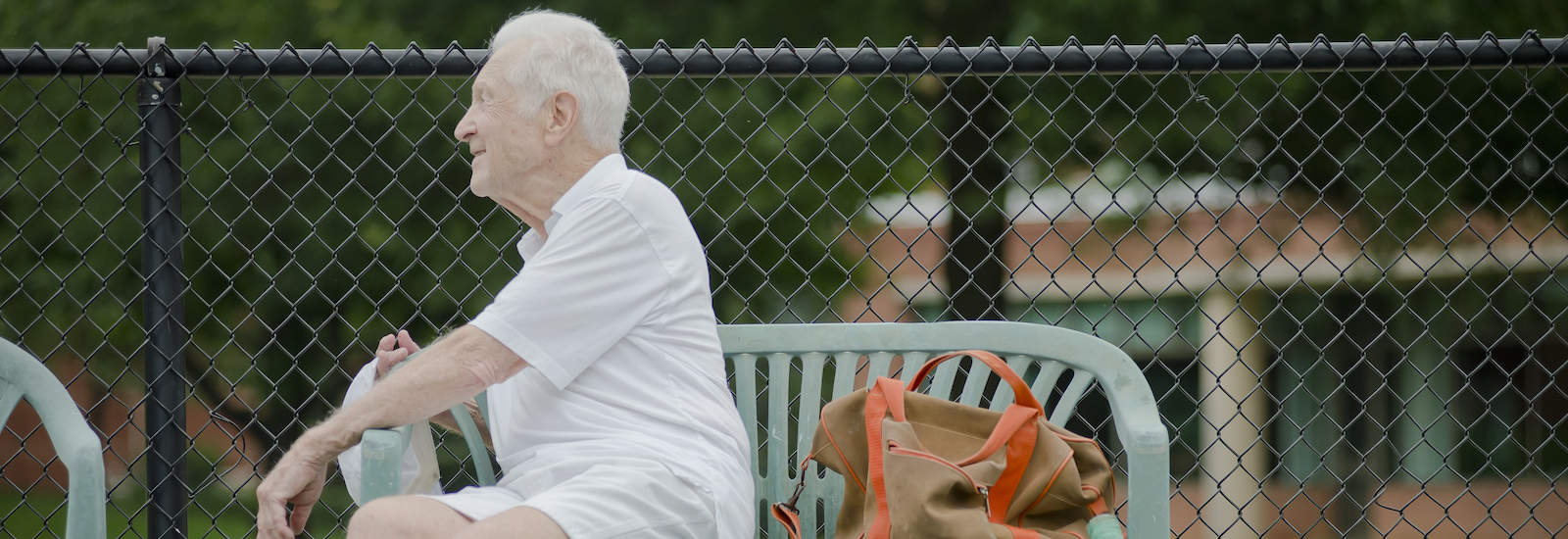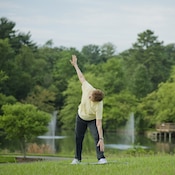
The 3 Basics of Successful Aging
Published: April 8, 2019
By Cathy Richards, Director of Wellness, Asbury Methodist Village
We’ve all seen the stories of people in their 80s and 90s performing incredible physical feats – running marathons, climbing Mt. Everest or hiking Yellowstone. Even if we don’t aspire to these heights, we would all like to be actively enjoying life in our older years. Don’t assume it’s all in the DNA. Get these three basics right and you’ll be on your way to healthier aging.
Interested in learning more about Asbury’s wellness lifestyle?
Contact us to find out about our Fitness Center classes open to Montgomery County seniors.
1. Don’t Sit So Much
 Study after study has shown the serious toll that long stretches of sitting takes on the body – decreased metabolism, spine and lower back issues, and decreased muscle functioning. As we age, we lose muscle mass naturally, so not just aerobic but weight-bearing exercise becomes more important. Exercise also happens to be the best thing you can do to maintain brain health, according to numerous studies. There are plenty of senior exercise programs out there. Often, retirement communities like ours open their fitness services and classes to people who are not residents. Or contact your local Office on Aging, YMCA or senior center.
Study after study has shown the serious toll that long stretches of sitting takes on the body – decreased metabolism, spine and lower back issues, and decreased muscle functioning. As we age, we lose muscle mass naturally, so not just aerobic but weight-bearing exercise becomes more important. Exercise also happens to be the best thing you can do to maintain brain health, according to numerous studies. There are plenty of senior exercise programs out there. Often, retirement communities like ours open their fitness services and classes to people who are not residents. Or contact your local Office on Aging, YMCA or senior center.
2. Mind Your Metabolism
 The experts’ advice: eat five smaller meals throughout the day rather than three large ones. Why? Digestion increases the body’s metabolic rate for an hour after eating. Your metabolic clearance time is how long it takes for your body to process a meal, typically three to four hours. If the total calories of a meal or snack is equal or less than the number of calories your body can process in this time (approx. 200-400 calories), then your body will burn most of them. If not, they head to storage – aka, fat. Hydration and activity levels are also important for optimal metabolic functioning.
The experts’ advice: eat five smaller meals throughout the day rather than three large ones. Why? Digestion increases the body’s metabolic rate for an hour after eating. Your metabolic clearance time is how long it takes for your body to process a meal, typically three to four hours. If the total calories of a meal or snack is equal or less than the number of calories your body can process in this time (approx. 200-400 calories), then your body will burn most of them. If not, they head to storage – aka, fat. Hydration and activity levels are also important for optimal metabolic functioning.
3. Give Your Body a Break
 This wellness basic includes two components – sleep and stress. Sleep is the time when your body and brain reboots. Not getting enough of it affects metabolism, brain functioning and emotions, all of which link to energy. Sleep deprivation is linked to increased risks in areas like heart disease, diabetes, high blood pressure and depression. It’s serious business. Shoot for at least 7-9 hours of sleep and plan a relaxing routine at bedtime that does not include electronics.
This wellness basic includes two components – sleep and stress. Sleep is the time when your body and brain reboots. Not getting enough of it affects metabolism, brain functioning and emotions, all of which link to energy. Sleep deprivation is linked to increased risks in areas like heart disease, diabetes, high blood pressure and depression. It’s serious business. Shoot for at least 7-9 hours of sleep and plan a relaxing routine at bedtime that does not include electronics.
Chronic stress is also linked to a host of ailments, anxiety, depression, obesity, and heart disease to name a few. Stress is particularly harmful to the senior population. The main culprit is a hormone called cortisol. While not bad in small, concentrated doses, in large doses, cortisol can become dangerous, preventing our brain from laying down new memories or retrieving old ones. It also adversely affects our neurotransmitters, the chemicals which facilitate communication within the brain.
So, In Other Words …
 Move your body, don’t overeat at any one meal, get enough sleep, and find ways to manage the stress in your life. A simple plan that’s anything but easy, as we all know. Luckily, it’s not all or none. Every bit counts! Give yourself a pat on the back when you simply take a few steps in the right direction. Before you know it, one new healthy habit will lead to another and you’ll be well on your way to more energy and better living!
Move your body, don’t overeat at any one meal, get enough sleep, and find ways to manage the stress in your life. A simple plan that’s anything but easy, as we all know. Luckily, it’s not all or none. Every bit counts! Give yourself a pat on the back when you simply take a few steps in the right direction. Before you know it, one new healthy habit will lead to another and you’ll be well on your way to more energy and better living!
